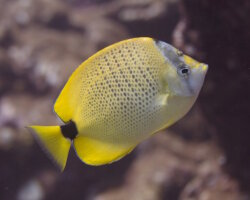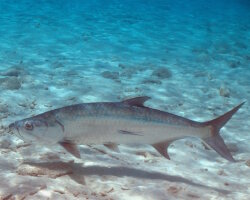Sealife guideExplore the diversity and secrets of bony fish in our oceansMarine vertebrates
Last updated on 08/13/2025 at 11:50 PM
Classification
The class of Osteichthyans includes all fish that have a bony skeleton, as opposed to fish with a cartilaginous skeleton, such as sharks and rays.
The class of Osteichthyans is divided into several subclasses. The most prominent is the Actinopterygians, which includes ray-finned fish. The other subclasses include fossil species as well as a few living species, such as the coelacanth, which lives at great depths.
Description

Anatomy of bony fish
To move through water and navigate in all directions, fish have a variety of fins, some of which appear in pairs on either side of the body. Each position has a specific fin name:
- The caudal fin, more commonly called the tail, is symmetrical in shape and provides most of the propulsion for the fish to move at high speed.
- The pectoral fins appear in pairs on either side of the fish's body. They are primarily used for maneuvering.
- The pelvic fins, also called ventral fins, appear in pairs on the underside of the fish's body.
- The dorsal fins, which can number one or two depending on the species, are located along the dorsal side of the fish. They help stabilize the fish in the water.
- The anal fin is located on the ventral side of the fish's body just behind the anus. Opposite to the dorsal fins, it serves a similar stabilizing function.
Fish have a respiratory system made up of gills through which water flows. Water enters through the mouth and exits behind the head on either side of the body through a single gill slit, called a gill opening.
Diet
Fish are mainly carnivorous, but some species are herbivorous or even sponge-eating.
Observation tips
Fish perceive their environment visually through their eyes. But be aware, they can also detect waves traveling through the water using their lateral line, which runs along the length of their body. This means your presence might be detected before you even enter their field of view! To approach fish, position yourself as far downstream as possible.
Did you know ?
The sailfish is the fastest fish in the world, reaching speeds of about 68 mph, closely followed by the swordfish.
Discover bony fish

Black-spot angelfish
(Genicanthus melanospilos)
(Genicanthus melanospilos)

Black-spot surgeonfish
(Acanthurus bariene)
(Acanthurus bariene)

Doctorfish
(Acanthurus chirurgus)
(Acanthurus chirurgus)

Floral wrasse
(Cheilinus chlorourus)
(Cheilinus chlorourus)

Milletseed butterflyfish
(Chaetodon miliaris)
(Chaetodon miliaris)

Neon goby
(Elacatinus oceanops)
(Elacatinus oceanops)

Spiny seahorse
(Hippocampus histrix)
(Hippocampus histrix)

Striated frogfish
(Antennarius striatus)
(Antennarius striatus)
Our latestUpdates

Wednesday, February 18th 2026
The Atlantic tarpon
The Atlantic tarpon is a large coastal fish that can grow up to 8 feet long and weigh over 330 pounds, with a silvery body covered in large, reflective scales. Known as the Silver King, it is famous for its spectacular leaps and fierce fight when hooked by sport fishermen.

Friday, January 30th 2026
The dugong
Discover the dugong, a gentle “sea cow” of tropical waters. Learn about its habitat, diet, reproduction, morphology, and the threats facing this unique marine mammal.

Friday, January 23rd 2026
Dolphins: ocean's smartest creatures
Discover dolphins, the ocean's geniuses: explore their intelligence, social behavior, sophisticated communication, species diversity and vital role in marine ecosystems.
Photo of the Day

Requin nourrice
(Ginglymostoma cirratum)
(Ginglymostoma cirratum)
